Please activate JavaScript in your browser to use all interface options.
Rosneft Took Part in the APEC Summit on September 6-7, 2012
07 September 2012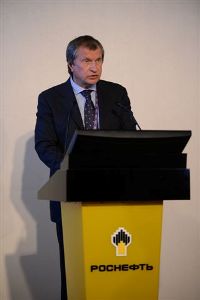
Rosneft signed a number of agreements at the APEC Summit, launched the construction of a petrochemicals complex in the Primorsky region and opened a refuelling facility in Vladivostok.
Russian President Vladimir Putin, who arrived in Vladivostok to take part in the APEC Summit, began his visit at a ceremony celebrating the launch of operations at Rosneft’s new Knevichi aviation refuelling complex at Vladivostok airport.
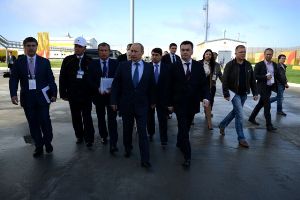 |
Rosneft President and Chairman of the Management Board Igor Sechin, who headed the Company’s delegation to the APEC Summit, presented the alternative refuelling complex to Mr Putin. The complex will service summit participants’ planes. Rosneft built the complex – the biggest of its kind in the post-Soviet period – for the APEC summit.
The complex meets all international aviation fuel supply standards. World-class equipment and automation systems coupled with a 14,000 cubic metre tank farm and 10 advanced fuel trucks help ensure rapid refuelling of the summit participants’ planes. After the summit the complex will fully cover the airport’s aviation fuel requirements.
Special measures have been undertaken to guarantee the facility’s environmental safety – its advanced wastewater treatment units meet purity requirements for fish breeding reservoirs.
The facility includes a fuel and lubricants laboratory for analysis of fuel quality, which helps increase flight safety. Aviation fuel will be supplied by the Komsomolsk refinery and the Achinsk Petrochemical Company, which are part of Rosneft. Aviation fuel will be provided directly to consumers at Knevichi through into-plane refuelling.
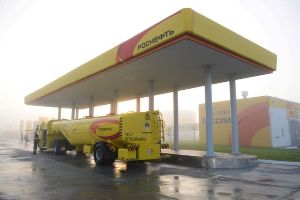 |
Transparent pricing, fostering a competitive environment and cutting out intermediaries helps keep airfares down, making air travel more affordable for the region’s population.
Investment in construction of the complex was 3.5 billion rubles. The complex can store 14,000 tonnes of fuel. The facility currently holds reserves of approximately 10,000 tonnes, while orders have been received for 2,500 tonnes of fuel for the APEC Summit.
Noting plans to expand the airport, Mr Putin asked whether the facility could meet the airport’s needs, if, for example, passenger flows were to increase from 5 million to 10 million people over the span of a few years.
Rosneft President Igor Sechin assured Mr Putin that Rosneft is ready to meet any of Vladivostok’s needs. “We can offer an increase of 30% right now. We will meet any requirements,” he said.
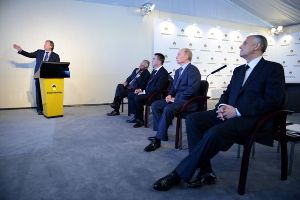 |
Igor Sechin also presented the Company’s Far East market development strategy. In his report, Mr Sechin highlighted that Rosneft sees this region as a strategic priority with considerable growth potential. Rosneft is already the largest employer and investor in the region, employing 13,300 staff at 28 businesses in the Far East Federal District. All of Rosneft’s business areas are represented in the Far East of Russia: exploration, production, refinery, logistics and sales. The businesses are integrated into a single chain: Sakhalin oil is refined at the Komsomolsk refinery and the resulting oil products serve as the basis for stable supplies in the region. The Company is currently implementing large investment projects to modernise the Komsomolsk refinery, construct the Eastern Petrochemical Company, explore and develop offshore projects and build pipelines and oil product supply facilities. Investment this year alone will amount to more than 70 billion rubles, with taxes (according to preliminary estimates) totalling approximately 8.1 billion rubles. More than 3.6 billion rubles will be used to finance social programmes.
Mr Sechin presented to President Putin the Company’s other strategic projects that have recently moved closer to practical implementation in recent months. In summer this year alone, Rosneft shifted a number of projects from planning to implementation. These include agreements with international partners on the launch of joint work at offshore deposits in Russia and abroad, the announcement of tenders to build Arctic class platforms and vessels and the creation of a venture with Itera to implement the Company’s gas programme.
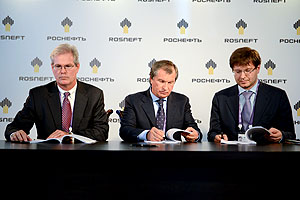 |
At Knevichi airport, Rosneft and ExxonMobil announced the selection of Vostochniy Offshore Structures Construction (VOSTCO) Yard to conduct a concept evaluation and feasibility study for a platform capable of safely exploring the shallow waters in the Arctic.
The agreement for the study was signed by Rosneft Chairman of the Management Board Igor Sechin; Stephen M. Greenlee, president of ExxonMobil Exploration Company; and Alexey Kozhemyakov, general director of Vostochniy Offshore Structures Construction (VOSTCO) Yard, in the presence of Russian President Vladimir Putin and Rex W. Tillerson, chairman and chief executive officer of Exxon Mobil Corporation.
Commenting on the agreement, Igor Sechin noted: “We are talking about practical implementation of strategic agreements signed with ExxonMobil. It’s very important that Russian companies will be the ones to develop the concept and subsequently build the platform so that they acquire new skills in this important area of the economy for the country. Appraisal of the concept for a platform to be used in our joint project with ExxonMobil in the Kara Sea will incorporate the most stringent environmental and industrial safety standards."
Rex Tillerson said, “ExxonMobil has been operating in the Arctic for more than 80 years and supports the continued development of state-of-the-art systems to protect the safety of workers and the Arctic environment.”
He also noted that ExxonMobil and Rosneft plan to begin drilling offshore in the Kara and Black Seas in 2014-2015. He noted that the programme to obtain technical data about the Kara Sea is running ahead of schedule and will be completed by the end of the month.
The signing ceremony was followed by a video link-up with a Rosneft subsidiary, the Eastern Petrochemical Company, which is constructing a large petrochemical facility near Nakhodka.
Through the video link-up, Russian President Vladimir Putin took part in the foundation stone laying ceremony, thereby starting construction of the new facility.
In presenting the project, Rosneft head Igor Sechin noted “output will be supplied to the Asia-Pacific market and to consumers in the Far East”. The facility’s general director Yuri Kasyuk gave assurances that the main production capacities would be online in Q1 2017.
The petrochemical facility will produce polypropene, high and low density polyethylene, monoethylene glycol and other petrochemical products. Annually, it will process 3.4 mln tonnes of feedstock supplied by Rosneft’s Achinsk and Komsomolsk refineries and the Angarsk Petrochemical Company. The capacity of individual units at the Eastern Petrochemical Company will be greater than any existing global peers. For instance, the plant’s pyrolysis unit will produce 1.4 million tonnes of ethylene a year. In terms of capacity, it will be unrivalled globally. Some 173 billion rubles will be invested in construction of the facility.
Technologies for the plant will be licensed from leading world-class specialist companies to ensure the facility’s technical prowess and safety. Particular attention was paid to environmental issues as early as at the design stage.
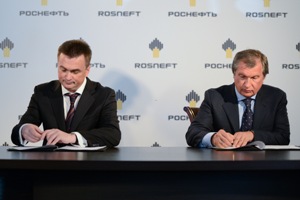 |
The complex is located close to fast-growing South-East Asian markets and has its own sea terminal in an ice-free port.
Construction of the facility will give a strong boost to the regional economy with a multiplier effect lifting tax returns at all levels. Thousands of new jobs will be created at the plant as well as in related sectors with the region reaping corresponding social benefits.
On the same day, Rosneft President Igor Sechin signed cooperation agreements with two regions in the Far East – the Primorsky and Sakhalin regions.
Igor Sechin and Primorsky Region Governor Vladimir Miklushevsky signed an agreement on cooperation in oil and gas refining, supplies of petroleum products and energy.
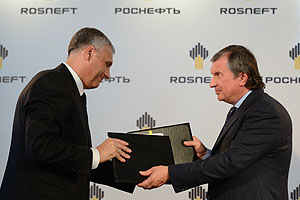 |
A key area set down in the agreement is the guaranteed, stable provision of petroleum products for the region’s consumers, including through the construction of petroleum product production and sales facilities and the development of petroleum product transport and storage infrastructure.
The agreement envisages the construction of a power plant at the Eastern Petrochemical Company with a design generating capacity of 685 MW of electricity and 1054 Gcal/h of heat. Design of the plant will take into consideration the heat and electricity needs of the Nakhodka urban district and surrounding villages.
Cooperation between Rosneft and the Primorsky region also aims to resolve environmental and industrial safety challenges. The Eastern Petrochemical Company’s operations will be carried out in full compliance with all environmental and industrial safety regulations and standards. A team of Rosneft specialists is already developing an environmental monitoring programme and crafting unique technical solutions that will make the facility safe for people and the environment.
Igor Sechin and Sakhalin Region Governor Alexander Khoroshavin also signed an agreement on the Company’s cooperation with the region.
The agreement envisages the implementation of projects to develop Sakhalin’s hydrocarbon deposits.
The parties reached agreements on the creation of favourable conditions for the geological study of the island’s deposits, boosting the efficiency of prospecting and oil and gas field exploration and improving oil recovery.
Environmental projects on Sakhalin take pride of place in the cooperation plans.
***
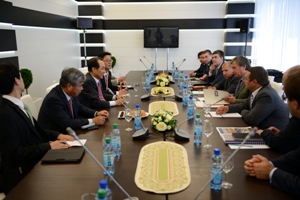 |
As part of the programme for Rosneft’s delegation to the APEC Summit, Rosneft President and Chairman of the Management Board held working meetings with the heads of international companies, as well as the Japanese Ambassador to Russia.
Igor Sechin met with Masami Iijima, president of Mitsui & Co. The two discussed possible involvement in the Eastern Petrochemical Company project and in projects to develop oil and gas blocks in the Irkutsk region and offshore of Magadan.
Mr Sechin also met Japanese Ambassador to Russia Tikahito Harada. The ambassador briefly informed the head of Rosneft about Japan’s new energy strategy, which is currently being developed. He also addressed Mr Sechin in his capacity as secretary of the presidential commission on the strategic development of Russia’s fuel and energy sector asking to support the work of the Russo-Japanese working group for oil and gas cooperation (the group was set up on Mr Sechin’s initiative while he was deputy prime minister).
The meetings covered a wide range of issues relating to the current state and prospects for mutually beneficial partnership with Russia’s largest oil company, as well as pressing issues and development prospects in Russia’s fuel and energy sector and issues relating to international cooperation in global energy security and stable energy supplies.
Igor Sechin met with the head of South Korean holding STX Corporation Kang Duk-Soo. The two discussed the possibility of constructing marine facilities and participation in Rosneft’s offshore programme, as well as the possibility of jointly trading oil and oil products.
Rosneft
Information Division,
September 7, 2012

-315xx70.png)

